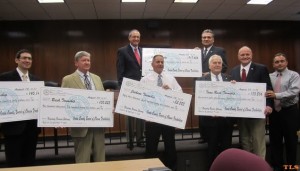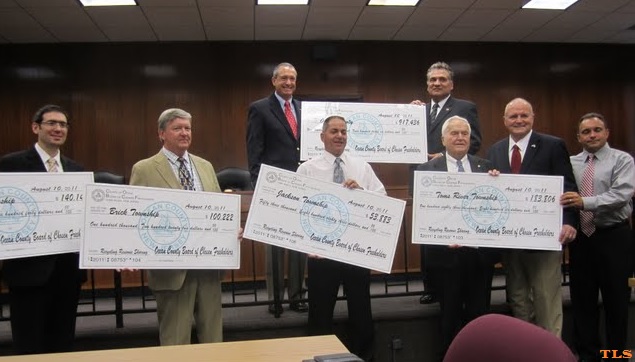 Ocean County municipalities will share in over $500,000 of recycling revenues that will be distributed by the Ocean County Board of Chosen Freeholders in the coming weeks.
Ocean County municipalities will share in over $500,000 of recycling revenues that will be distributed by the Ocean County Board of Chosen Freeholders in the coming weeks.
“Ocean County towns will be getting checks from us shortly for their outstanding recycling efforts under the county’s Recycling Revenue Sharing Program,” said Freeholder James F. Lacey, who serves as liaison to the county recycling program. “As we work at keeping government cost effective and efficient, this is one program that has a positive impact on all of our towns.”
The amount to be distributed is for recycling collection during the second half of 2012.
“For the year of 2012, Ocean County returned almost $1 million to its municipalities in recycling revenue sharing,” Lacey said. “Our towns recycled just over 77,000 tons of material last year.”
“This revenue sharing program has given us the ability to make trash into treasure,” said Freeholder Director John P. Kelly. “The recycling program, under the leadership of Jim Lacey, has been profitable economically and environmentally.”
Since 1995, the county has distributed more than $15 million to the municipalities that participate in the county’s recycling program through its Recycling Revenue Sharing Program. The amount returned to the towns is based on the amount of recyclables collected and brought to the county and the price per commodity in the current market.
For example, Lacey noted that the price received for plastics dropped by $173 per ton while aluminum remains high at $1,319 per ton.
The payout for the period of July to December, 2012 was $12.14 a ton.
“The amount we return to our towns is based on the amount recycled and what the market has to offer,” Lacey said.
Lacey noted that one of the biggest benefits of recycling is towns reduce the amount paid to have the material sent to the landfill.
“For instance, by recycling 41,000 tons of material during the second half of 2012, towns saved a combined $2.9 million by avoiding the tipping fee at the landfill,” Lacey said.
Lacey said towns can use the money as needed although many invest it back into the recycling program.
“If a road needs to be fixed, or a park needs to be upgraded, this money can help with those projects,” Lacey said. “This is a return on their recycling effort.”
The towns and the amounts they are scheduled to receive are: Barnegat Township, $16,577; Barnegat Light, $1,468; Bay Head, $1,471; Beach Haven, $5,963; Beachwood, $6,485; Berkeley Township, $20,827; Brick Township, $49,477; Eagleswood Township, $1,392; Harvey Cedars, $1,691; Island Heights, $1,701; Jackson Township, $25,190; Lacey Township, $25,722; Lakehurst, $1,586; Lakewood Township, $74,342; Lavallette, $3,989.
Little Egg Harbor Township, $18,493; Long Beach Township, $14,152; Manchester Township, $17,950; Mantoloking, $593; Ocean Township, $7,340; Ocean Gate, $1,645; Pine Beach, $1,788; Plumsted Township, $3,317; Point Pleasant Beach, $6,940; Point Pleasant Borough, $21,514; Seaside Heights, $4,539; Seaside Park, $4,119; Ship Bottom, $4,429; South Toms River Township, $1,319; Stafford Township, $40,974; Surf City, $4,149; Toms River Township, $104,498; Tuckerton, $4,441.


so the question is why do we have to pay for additional Yellow cans????
lakewood in one of the biggest towns so the ratio makes sense
Ref- the money Lakewood receives – where is the money going? I don’t see my taxes going down.
Hey #3: That is why your taxes have not gone up drasticly.